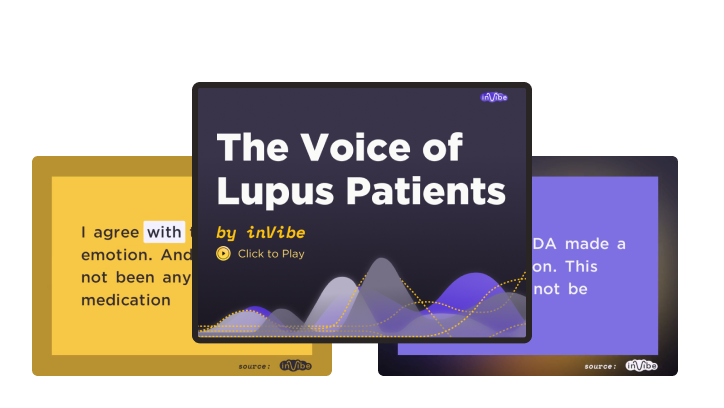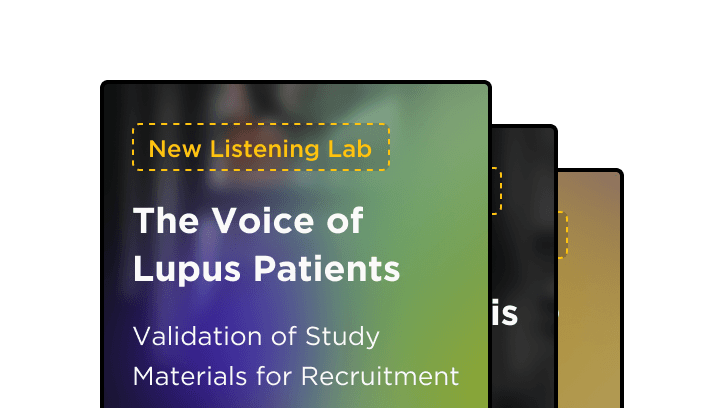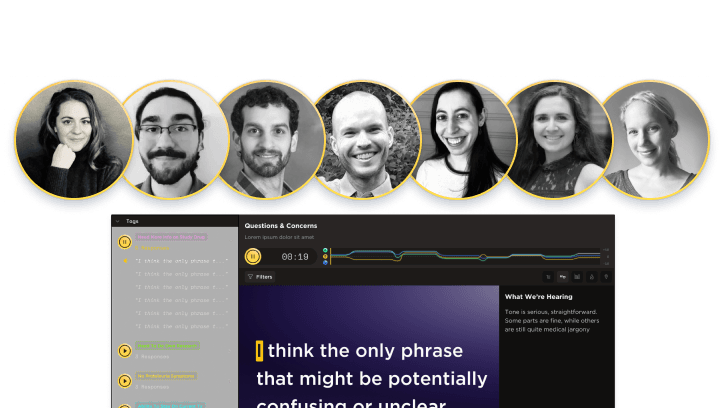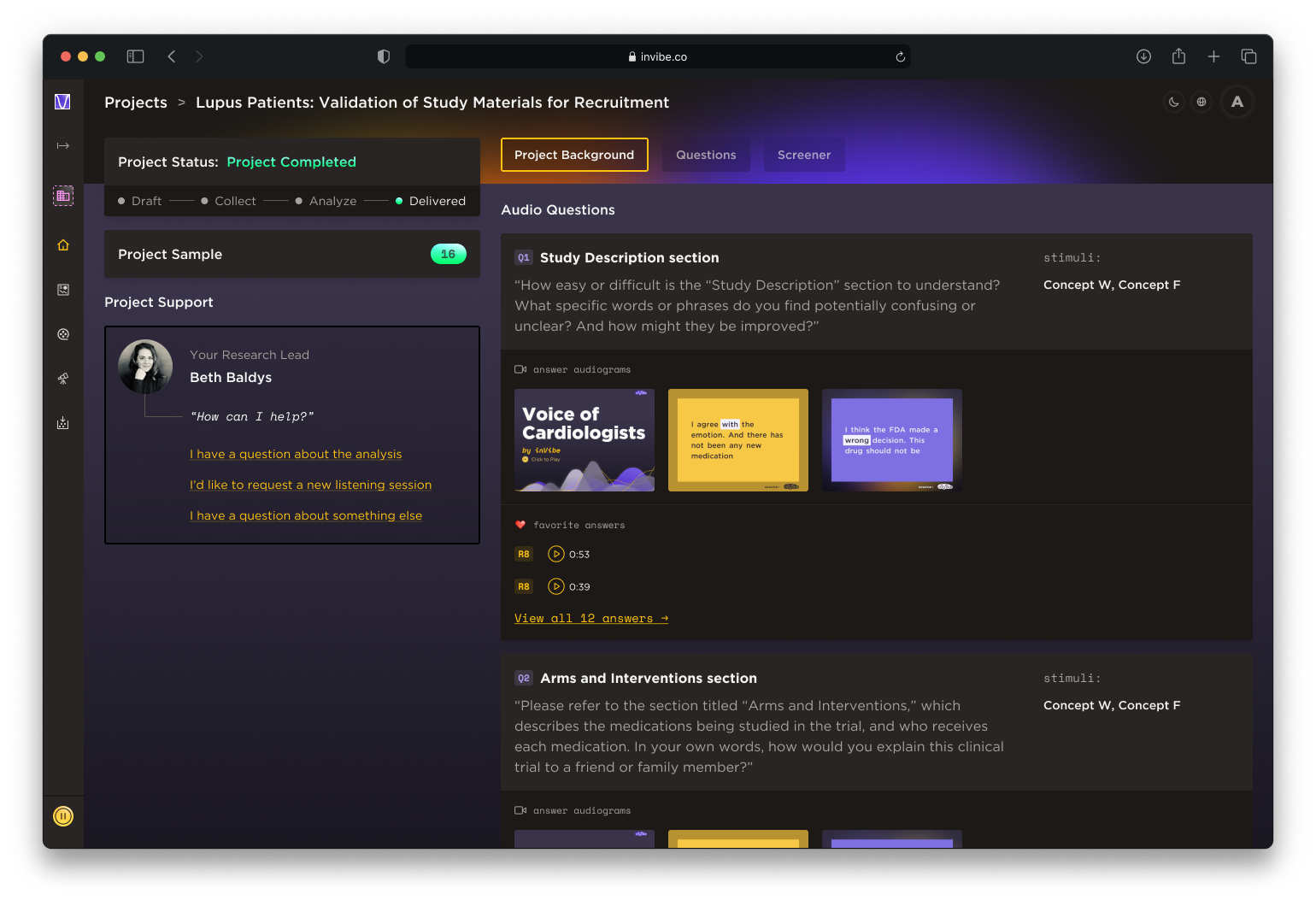Use Case
TrialPulse — Evaluation of Clinical Trial Recruitment Assets
Case Study
Leveraging the Patient Voice to Collect Lupus Patient Input on Clinical Trial Recruitment Materials
Client Goal
In preparation to recruit for a clinical trial, the pharmaceutical sponsor sought to better understand perceptions, impact and clarity of proposed participant-facing recruitment materials.
Objective 1
Capture perceptions of the overall clinical trial experience.
Objective 2
Measure perceived impact of the trial.
Objective 3
Determine perspectives on understanding and clarity of materials.
The inVibe Solution
inVibe’s TrialPulse solution allowed our pharmaceutical client to quickly and efficiently deploy a voice-powered research study to validate and optimize recruitment materials.
1. Collect
Within 48 hours, inVibe screened and recruited 20 patients representing a diverse cross-section of the lupus community. The patients reviewed study-materials on their computers and smartphones, participated in an automated phone interview, and responded to questions about the materials simply by speaking.
Key Questions
Q1
How easy or difficult is the “Study Description” section to understand? What specific words or phrases do you find potentially confusing or unclear? And how might they be improved?
Q2
Please refer to the section titled “Arms and Interventions,” which describes the medications being studied in the trial, and who receives each medication. In your own words, how would you explain this clinical trial to a friend or family member?
Q3
Please refer to the section titled “Outcome Measures” which explains how the investigators will decide if the experimental treatment is working. What are your overall reactions to these treatment goals? What, if anything, would you add to this list?
Q4
Imagine that you were looking to enroll in a clinical trial for lupus and this was one of many trials you came across. How likely would you be to consider enrolling in this trial, and for what reasons specifically?
2. Analyze
inVibe’s analysts leveraged their language expertise and advanced NLP tools to process, evaluate and analyze multiple aspects of each patient’s response, including content, language, and emotion derived from speech-emotion recognition, allowing for deeper insights, faster.
What is Said
Summarize and categorize the content and themes.
How it’s Said
Identify the language patterns and construction.
How it Sounds
Utilize machine learning and acoustic technology to assess the emotionality.
3. Deliver
The client was provided with an interactive report via an online dashboard, along with the voice data, transcripts, and a high-level analysis. An in-house analyst walked the client through all of the most meaningful data, supporting each insight with specific voice data.
Audiogram
Videos
Clients have access to drag & drop tools to instantaneously create kinetic text animations from transcripts for internal sharing.

Listening
Labs
inVibe delivers self-guided interactive stories assembled from transcripts, audio, and charts – annotated with high-level expert observations.

Expert
Perspective
inVibe’s team of in-house analysts and language experts walk clients through the insights and recommendations derived from the research.


Key Insights & Recommendations
Based on the insights, inVibe recommended that the team take the following actions to optimize their patient-facing materials:
Completeness of Content
#1
Action:
Patients worried about the lack of information provided regarding potential side effects. These missing details led them to make assumptions, which caused additional worry. inVibe recommended providing more details on potential side effects and a plan to manage them should they encounter these.
Ease of Participation
#2
Action:
Patients felt the overall trial participation requirements were reasonable and would not be a significant barrier. Only a few respondents deemed the 48-week timeframe “too long” and questioned their ability to commit. inVibe recommended including a visual timeline that depicts the time commitment requirements.
Clarity of Language
#3
Action:
Patients expressed confusion over the terminology and potential outcomes. Those who struggled to understand the materials were more likely to say they would NOT consider participating in this trial. inVibe recommended supplying a glossary of terms and further clarifying the study endpoints.
Ready to learn more?
/voice
/resources
/use-cases
- New Data Intelligence
- TrialPulse — Evaluation of Clinical Trial Recruitment Assets
- Concept / Message Testing
- Customer Journey Inflection Points
- Agency Pitch for New Business
- TrialPulse — DCT Design and Informed Consent
- Language of Disease
- Customer Stories
- Decision Drivers
- Market Trends
- TrialPulse — Disease Burden and Endpoint Selection
- HCP – Patient Communication
2025 inVibe - All Rights Reserved
